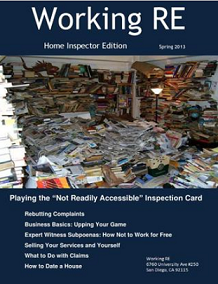 |
>> See Past News Editions >> Follow our NEW Home Inspector RSS Feed >> Click to Print >> Note: If you live in “high-priced” states like AZ, CA, IL, NJ, PA, FL, TX or WA, OREP does not limit coverage or raise your rates. The same rates apply in all states where program is offered. Same day coverage. |
Are You Who Your Client Thinks You Are?
How Simple Communication Errors Become Complex
By Joseph Denneler, Esquire
Advertising has come a long, long way in a short amount of time. Many of us can still recall when advertising your business was as simple as printing some business cards, putting lettering on a van and purchasing a listing in the local phone book. The advent of the Internet, social media and marketing software brought many new methods to communicate who we are to potential clients. Unfortunately, the ease with which we can communicate to the masses brings with it new issues and avenues of liability.
Most of the lawsuits where I am assigned to represent the inspector include a claim for some form of misrepresentation of either the inspector’s qualifications or the scope of services. Most of these misrepresentation claims have no basis. Those that do, however, quickly become more about the misrepresentation and less about the alleged error in the inspection itself. Why do these cases veer off into this territory? More often than not, it is because the plaintiff’s attorney finds an avenue to recover the litigation expenses for his or her clients that has nothing to do with the quality of the services provided by the inspector.
Generally, a plaintiff in a civil lawsuit cannot recover attorney’s fees and litigation costs from a defendant as part of a damages award. However, many states have some form of a consumer protection law that allows a plaintiff in a civil case to recover the attorney’s fees and costs incurred in litigating a claim where there is a misrepresentation of the quality or scope of the services provided. Whether that provision is contained in a home inspection law or regulation, or whether it applies generally to all professions, these statutes and provisions turn simple cases into legal quagmires, add tremendous costs to defending a home inspection lawsuit, and could result in an award against an inspector who is not covered by insurance.
The most common form of alleged misrepresentation of a home inspector’s qualifications arises from misstating affiliation with an organization. Many inspectors join national or local home inspector organizations at one time or another. Most of those who join organizations advertise the fact of their membership. In states that do not have home inspection regulations or licensing, affiliation with a recognized local or national organization could be a primary factor in a client deciding to retain an inspector. Unfortunately, many inspectors who discontinue their membership in these organizations fail to update their advertising and other documentary materials to reflect that change.
I recently defended an inspector in a litigation matter where the inspector used the logo of a state based home inspector association on his inspection report and his inspection contract. Unfortunately, my client had let his membership in that association lapse several years prior to the lawsuit. More unfortunately, and ironic, was that the attorney representing the plaintiff in that lawsuit was formerly the general counsel for that home inspector association. The plaintiff’s attorney checked on my client’s membership and found it had expired, and then used that to add claims for misrepresentation and fraud to the lawsuit. What started out as a relatively simple defense became a full-fledged war. This ultimately created claims for which my client had no insurance coverage. Worse, the entire case hung on credibility.
(story continues)
The plaintiff’s case hinged on something the plaintiff alleged the inspector said during the inspection. The inspector denied making that statement. A jury would need to decide which party was more credible in order to decide the case. However, my client’s credibility was in question regarding something that had nothing to do with his skills or how he performed this inspection. This was a game changer that ultimately resulted in my client having to settle the case rather than fight it, despite having good defenses to the claims regarding the inspection. Why? Because the misrepresentation claims were not covered by insurance, and my client would be bankrupt if a jury found against him. That simple error in advertising made a defensible case indefensible and drove up the litigation expenses for the inspector. This is a simple error that could have been easily avoided by simply reviewing his inspection report cover and deleting any reference to the organization to which he no longer belonged.
Unfortunately, it’s not just the folks who fail to update materials they create that land in the litigation vortex of misrepresentation claims. Another recent client had purchased his home inspection business from someone he worked with for several years. The former owner created a website describing his business and advertising his affiliation with a national association of home inspectors. The website contained many references to that association’s standards of practice and why it was important to seek out members of that association when choosing a home inspector. When my client bought the business he was not a member of that association. After the former owner left the company, nobody at the company was a member of the national association. Anyone viewing the website would have been left with a much different impression and my client never updated the website.
After my client was sued for an inspection, the intrepid plaintiff’s attorney did some basic research, learned that my client was not a member of that national association, and quickly amended his lawsuit to add claims for misrepresentation and fraud. A formerly smooth path defending the case became a ride in a jalopy on a deteriorated roadway. The case became no longer just about the inspection. It was now about the website, a threat that the plaintiff would report this incident to the state inspector regulatory board, and a lack of insurance for the misrepresentation claim. This was another winnable case made questionable by things having little, if anything, to do with the performance of the inspection.
In each of the above examples simple oversight and due diligence would have prevented misrepresentation claims. Here are some simple steps you can take to avoid the same issues:
• Check the information in your contracts and reports for accuracy and, where applicable, compliance with state home inspector laws and regulations.
• Review your website and, where necessary, update it to provide accurate, up-to-date information on you and your affiliations.
• If you are working in multiple states, be sure that your marketing materials are compliant with each state where you provide services.
As a professional home inspector, be sure to take the time to make sure your clients know who you are and what you can do. Taking simple, proactive steps to do that now can save you time and money down the road.
About the Author
Attorney Joe Denneler provides inspection contracts written to the home inspection standards applicable and specific to your state. OREP members enjoy 25 percent off these services. To contact Joe or if you’re an OREP member and would like the discount code, email isaac@orep.org. online term paper



by Lon A Henderson
What about advertising credentials earned while a member of an organization that no longer exists. Specifically, NAHI. I was a CRI and chapter president. I still have the CRI logo on my web page, but of course, NAHI no longer exists. Do I have a credibility issue?
-by Mal Brewer
Thanks Joe for a terrific article. I’ll certainly be checking my online representations. You know it’s often the unexpected things that come back to bite you rather than the obvious things. Most inspectors are competent at their work. I understand that the most common cause of litigation is the failure of inspectors to warn our clients of the potential issues rather than missing defects or problems. We all need to concentrate on reporting on issues and warning of the possible consequences of those issues.
-by Bill Hawkins
Excellent topic! Thanks for the reminder to always stay on top of our documentation and what we put forth to the public!
-by Free Speech
A better question is, “Are my clients who I think they are”?
-